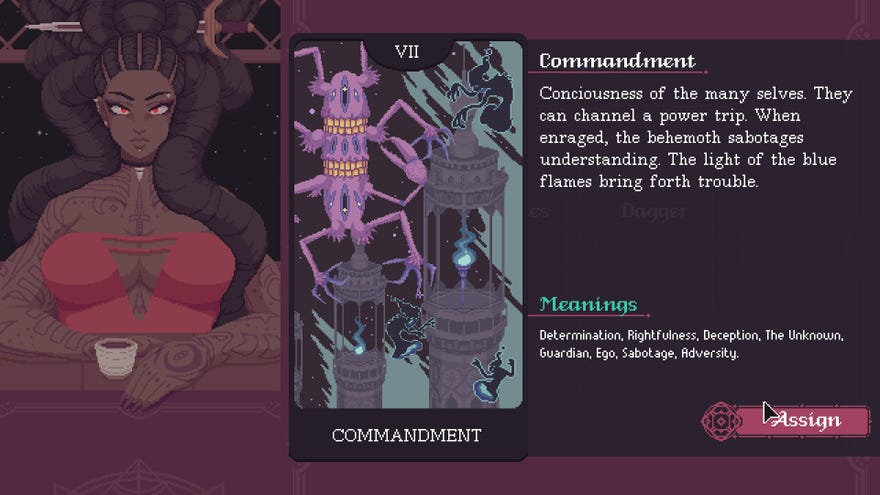The Cosmic Wheel Sisterhood review: a wonderfully witchy fable told through player-created Tarot
Something wicked this way comes
The Cosmic Wheel Sisterhood is many, magical things, but initially, at least, it is a card game in which you create your own cards. This takes the form of an MS Paint-esque editor in which you glue together a background, character assets and a collection of props, rotating, duplicating and altering the size of each asset with the mouse. Each asset soaks up a certain amount of arcane energy, divided between the four elements, which mean somewhat different things here than in the spell systems of other games. And each final design generates a different combination of meanings, some of them contradictory at a glance, all of them keys to the game’s weird, whimsical and sorrowful wider universe.
It seems an overly rudimentary system at first, though that’s coming from the perspective of somebody who’s reasonably familiar with Tarot, one of the game’s chief influences, and partial to devising their own crummy decks of visual poetry cards. In particular, I grumped to myself about the limits on shrinking and enlarging: I wanted to fashion more abstract, prog-rock designs with faces in pixellated close-up, whereas The Cosmic Wheel Sisterhood sort of defaults to “dude holding thing against landscape” setups familiar from the Rider-Waite Tarot. While there are pieces you can plug in and leave out as you see fit, the system also insists that you include certain props from each batch, and I’ll admit to using the layer tool to hide unwanted skulls, floral wands and so forth behind other assets.
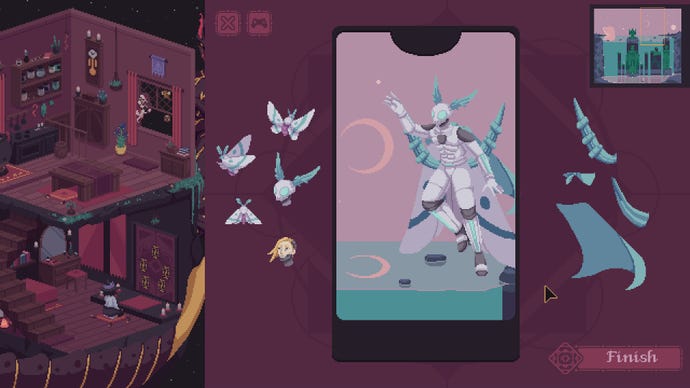
But I am, of course, partly describing my own initial shortage of inspiration: the more you tinker and acclimatise to the editor, the more artful your methods become. And as your designs grow more vivid or delicate (you eventually unlock the option to melt them down, clearing off your apprentice-level creations), you also grow more and more aware of how beautifully they fold into and facilitate the game’s branching chapter-based story.
The Cosmic Wheel Sisterhood is the tale of Fortuna, an immortal witch banished to a surprisingly luxurious asteroid dwelling for a thousand years by her coven’s leader, Aedana, after prophesying catastrophe. As the plot begins, Fortuna has spent 200 years twiddling her thumbs, without even her trusty Tarot deck for company, and has finally had enough. She casts a forbidden spell to summon Abramar, an otherworldly Behemoth who is part-lobster and part-humanoid, with far too many eyes and a mouth that splits alarmingly into a flame-licked skeletal grin. Fortuna signs a contract with Abramar to regain her freedom and, if you so choose, get some kind of payback on Aedana: among the story’s key considerations is whether her banishment has left her twisted and vengeful, or wiser and forgiving, or some combination of the above.
In the process of bonding with Abramar, Fortuna gains the ability to craft divination cards of her own, splicing them together from the game's own myths and legends and her own, troubled memories. Another aspect of working with the game’s cards is slowly understanding this personal or wider significance. At first, you might take the core bits-and-pieces for an artist goofing around with fantasy tropes and pop cliches, such as iron golems or roads winding into the sunset, but each collection of assets has a precise resonance that flourishes in the course of building and rebuilding the deck.
The divination cards are also your key means of interacting with the game’s other characters – a sumptuously illustrated and, with the possible exception of one three-headed spectre, powerfully sexy cast of hedge-witches, huntresses, sharp-suited oracles, bright-eyed clerks and much else besides, each with their own delightful theme music, a particular brand of sorcery, and a strong stance on the busy politics of the Cosmic Wheel universe.
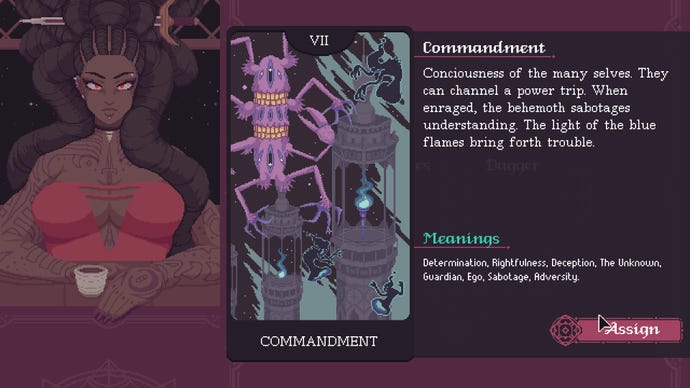
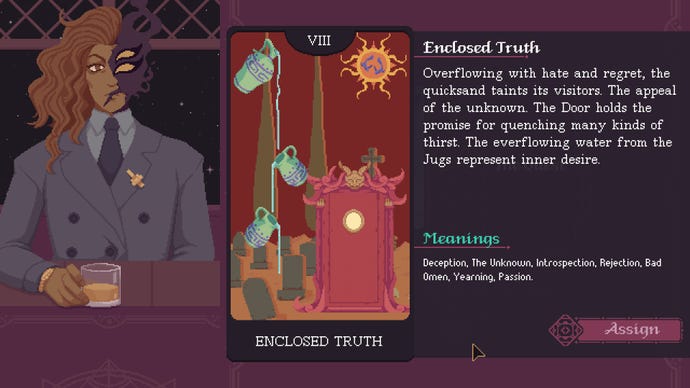
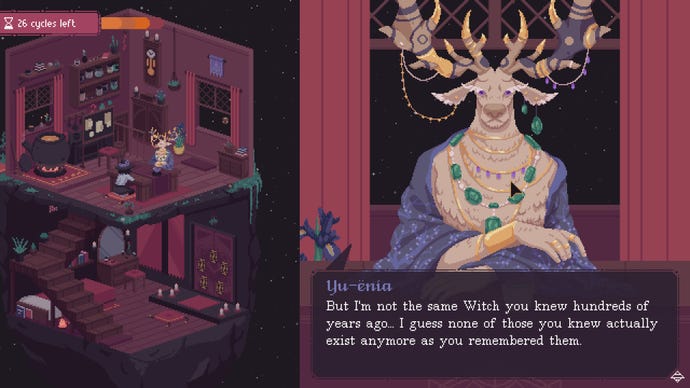
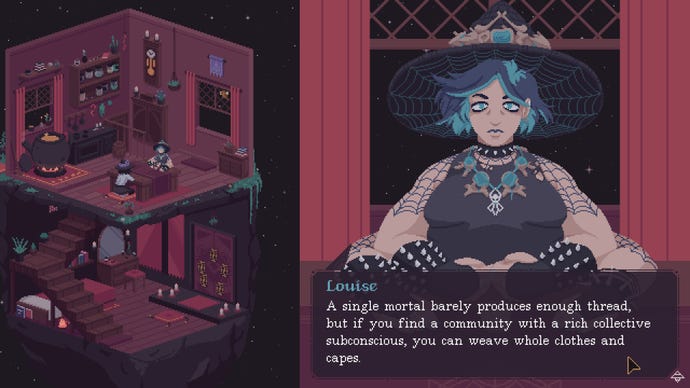
While Fortuna remains consigned to her asteroid for much of the proceedings, she gains permission early on to receive visitors, each rocking up to her window on a broomstick, magic carpet or what-have-you to discuss ancient grievances, love affairs and various occult shenanigans, together with all-important trivia like the virtues of pizza. Many of these conversations conclude with a card reading, where you draw one or more of your slapped-together Major Arcana to answer questions posed by your guest, picking from a handful of responses per card.
These readings are engagingly penned - the writing blends a contemporary register with funky fantasy jargon - and branch the plot in clever ways. The act of haggling over the cards also lends your conversations with fellow witches and other entities a default air of playfulness, rising from a foundation of trust and empathy, that feels very nourishing. There’s a sinister resourcing undertone, mind you: card readings generate arcane energy to spend designing other cards, with different interpretations producing different elements. You may feel tempted to predict the worst simply to harvest a few Fire or Earth points for a more expensive card.
It’s a gentle tension, however: sometimes, the resourcing system serves only to nudge you towards responses and character dynamics you might otherwise dismiss. Speaking as somebody who tends to pick the fourth, non-committal dialogue response in any given RPG chinwag, I found the lure of elemental rewards a useful, but not irresistible incentive to experiment.
The characters are all great fun, however you steer them across the waters of destiny. My favourite could be the aforesaid hedgewitch, Jasmine, for those fleeting moments when her air of butter-wouldn't-melt naivete collapsed into the acidic demeanour of a character who is, in fact, several centuries old, with her fair share of axes to grind. The writing tackles some complicated subjects and emotions, including terminal illness, gender dysphoria and estrangement from family members, but does so with a gracefulness that makes me think of a kind teacher sitting next to me at a campfire.
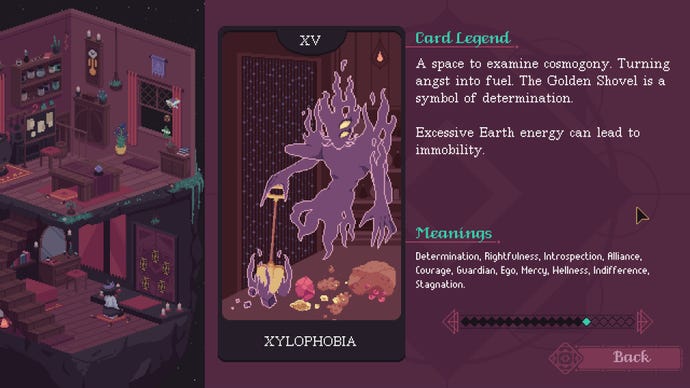
The Cosmic Wheel Sisterhood is broadly about that symbiotic alternation between conversations and card creation, but it undergoes some surprising formal mutations. There are flashbacks to Fortuna’s prior terrestrial existence, some of which harbour simple minigames. You can also delve into Fortuna’s library to study backstory documents or play a strikingly varied selection of mini-interactive fictions - my favourite being a conversation between a confused skeleton and a cranky necromancer. These literary diversions cough up a few bonus elemental points and harbour clues about how best to combine card materials so as to launch the plot down particular avenues, though I haven't had a chance to replay and explore just how decisive these choices can be.
And then there’s the game’s abrupt transformation into a folksy election simulator in the last few chapters. This calls on you to put the knowledge of wider events you've gleaned from card readings and assembly into practice, by sending off characters to gather dirt on rival candidates, drum up support from specific factions, and campaign for or against particular policies.
This latter segue feels a teensy bit wayward, perhaps. The game is arguably better for a third-act switch-up, but at around 5-10 hours in length, it doesn’t give you time to weary of card-reading. I’m not sure I could stand 200 years of this, but I’d have happily lingered another ten hours on Fortuna’s woebegone asteroid, collaging a fresh future for any wandering occultist who might drop by for tea.
Disclosure: Former RPS contributors Jay Castello and Giada Zavarise both worked on The Cosmic Wheel Sisterhood.
This review was based on a retail build of the game provided by publishers Devolver Digital.
